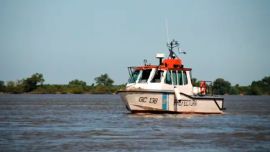With limited funding available for his debt-ridden Argentina, President Alberto Fernández has decided to strengthen ties with China during his administration – a move which would mean rebooting mothballed key infrastructure projects and seeking funding to bolster the Central Bank’s foreign currency reserves.
Argentina and China already share close ties dating back years, but the bilateral relationship blew hot and cold during Mauricio Macri’s 2015- 2019 presidency. Now, experts say, the idea is to push ties further, while also keeping on good terms with US President Donald Trump and his government – a difficult path to tread. The United States is key to Argentina’s future, especially when it comes to debt restructuring talks with the International Monetary Fund (IMF).
“Fernández will seek a mature relationship with China and the US, seeking to get the best he can from both countries. If China wants to invest and provide funding, then great. Need will prevail over the ideology,” Marcelo Elizondo, a trade expert at consultancy DNI, told the Times.
Argentina has an “integral strategic alliance” with China, a high diplomatic status the latter reserves for only a few countries. The relationship between the two was strengthened during the 2007 to 2015 administrations led by former president Cristina Fernández de Kirchner, who signed more than 20 treaties with Beijing. In the last decade, Chinese products went from accounting for five percent to 20 percent of Argentina’s total imports. Exports to
China did not grow at the same rate, however, only increasing from eight to 10 percent. This has led to a record trade deficit of more than US$2 billion between the two countries.
“China can be an alternative to get investments and foreign currency reserves. Fernández wants to have a good relationship as he knows China is much more interested in investing in infrastructure projects than the US or Europe,” said Ariel Slipak, an economic specialist on Sino-Latin American relations.
CLOSER TIES AHEAD?
Fernández had already met with Zou Xiaoli, China’s ambassador in Argentina, during the presidential campaign and some key foreign policy advisors, such as Jorge Argüello – a key foreign policy aide to the president who now serves as ambassador to Washington – and Senator Jorge Taiana, who recentlyvisited the Chinese Embassy in Buenos Aires.
Following the election, Geng Shuang, a spokesperson for China’s Foreign Ministry, congratulated Fernández for his victory, declaring that Beijing values its ties with Argentina and that it would work for “stable progress” in the relationship. China’s President Xi Jinping also sent a letter to congratulate Fernández personally.
Finances are, as expected, key to the relationship. Argentina has benefitted from a US$19-billion currency swap deal with China, which has helped bolster Central Bank foreign currency reserves, which dropped by US$28 billion in the last six months of 2019. A first part of the swap came under the Fernández de Kirchner administration and then Macri agreed to an extension.
“Argentina hopes to strengthen the relationship with China, consolidate Chinese investments and increase bilateral trade,” Ernesto Fernández Taboada, the head of the China-Argentina Chamber of Commerce, told the Times. “There are already 75 Chinese firms working in Argentina and the list could keep on growing.”
Extending the currency swap is on the agenda for Fernández, as well as moving ahead with a long list of infrastructure investments that were placed on hold by the Macri administration. Nevertheless, it will all depend on the result of the debt talks with the private creditors and the International Monetary Fund, experts agree.
Argentina agreed to the construction of two Chinesefunded dams in Santa Cruz during the Fernández de Kirchner administration. The dams will require US$4.7 billion of investment, of which Chinese banks will provide 85 percent, and will be built by the Chinese company Gezhouba and Argentine firms Electroingenería and Hidrocuyo.
Nevertheless, the project was halted by the Macri administration amid concerns over its environmental impact and over costs. Now, construction has restarted – Vice-President Fernández de Kirchner even recently visited the site where the dams will be located, one of which will take the name of her late husband Néstor Kirchner.
The same is the case with the Chinese-funded nuclear power plant. Fernández de Kirchner signed in 2015 a deal with China to build two nuclear plants, which was then downsized to just one by Macri. Amid the country’s economic downturn, the Cambiemos didn’t move ahead with construction, which is predicted to finally start this year.
The contract for the nuclear plant, which is expected to be signed following a settlement of the debt talks, will include a US$10-billion loan from the Industrial and Commercial Bank of China (ICBC), which will cover 85 percent of the plant’s construction costs.
“Argentina is going through an economic crisis and money is tight. Investing in nuclear power requires a long-term commitment, but China can offer subsidised capital to its foreign customers,” said Mark Hibbs, sen ior fel low at Carnegie’s Nuclear Policy Program. “This gives China an advantage over other nuclear exporting countries.”
CHALLENGES AHEAD
Opening up the local market over the last few years to Chinese manufacturers, without restrictions, and being limited to exporting mainly commodities, has increased Argentina’s trade deficit with China, which last year reached US$2.2 billion. This will be among the key issues on which the Fernández administration will have to work.
Exports to China dropped 4.3 percent last year, while imports also declined 18.7 percent, according to INDEC statistics bureau. Trade with China represented 10.8 percent of all Argentine exports and 18.9 percent of all Argentine imports.
The trade imbalance has been a long-term problem in the relationship between both countries, made more evident following former president Fernández de Kirchner’s close geopolitical ties with China.
While Argentine exports to China are mainly commodities like soybean and soybean oil, Chinese imports to Argentina include low-, medium- and hightech manufactured products, such as mobile phones, computers and air-conditioning units.
“About 70 percent of what we export are soy-related products, sold by large agricultural companies. But there is big potential to sell other goods, some even with added value like wine or jams. That would help to reduce the trade deficit,” Elizondo said.
According to Taboada, Argentina has to keep opening up its market to China, especially considering the expansion of the Chinese middle class and its appetite for imported goods. Organics have a lot of potential, he said, considering Argentina is the world’s second-largest producer of organic foods.
Red wine exports are on the rise, Fernández Taboada explained; as are sweets, milk powder, women’s clothing, wood, fruits, prawns, fish, biotechnology prod u c t s a n d s o f t w a r e . H e highlighted that small and medium-sized Argentine companies should explore the Chinese market with greater interest.
EYEING DEALS
China has high hopes in Latin America for its One Belt-One Road Initiative, a powerful economic and diplomatic programme which could transform global trade through improved connectivity. Among its objectives is to develop bioceanic trade corridors in Latin America to lower the transportation costs of primary products to Asia. The largest economies in Latin America – Argentina, Brazil and Mexico – have not yet signed any Belt and Road agreements, but this could soon change. Fernández has already said he would be interested in signing a deal, a U-turn from the rejection previously seen during the Macri administration.
“Although Argentina hasn’t signed the agreement yet, it’s already operational as China is very active in infrastructure and investment in the country. It will likely move forward and I don’t see the US influencing much to prevent it from happening,” Leonardo Stanley, researcher at Argentina’s Centre for State and Society Studies (CEDES), said.
At the same time, China hopes to move forward with a freetrade agreement with the Mercosur bloc, either signed in group with the bloc or individually with each country. Argentina hasn’t shown interest in this in the past, but the regional outlook has now changed.
Uruguay’s newly elected president Luis Lacalle Pou, Brazilian President Jair Bolsonaro and Paraguayan President Mario Abdo Benítez have shown agreement over the idea of opening up Mercosur to new trade partners or even making its rules more flexible in order to allow bilateral deals, something not permitted by the current rules.
But Fernández has so far hinted at going in the other direction. He questioned Mercosur’s recent free-trade agreement with the European Union, calling for its review due to the impact it could have on local industries.
“Argentina is now very distant from the trade rules proposed by the rest of the Mercosur bloc members, which want to open up trade. Nevertheless, I don’t imagine they would like to leave Argentina out of the discussions. It’s all part of a game of interests,” said Sergio Cesarín, coordinator of the Asia Pacific and Indian Studies Centre at the National University of Tres de Febrero (UNTREF).


























Comments